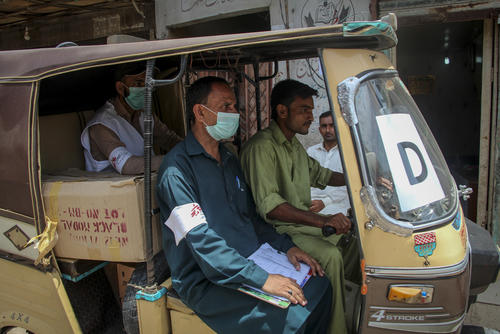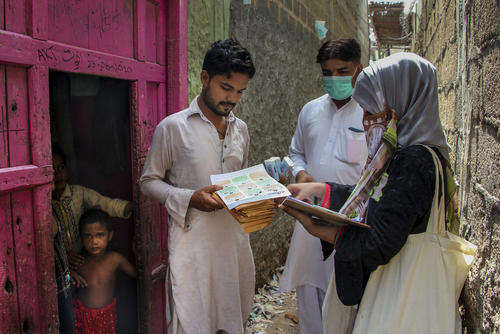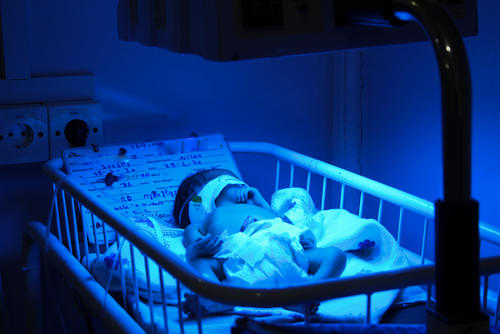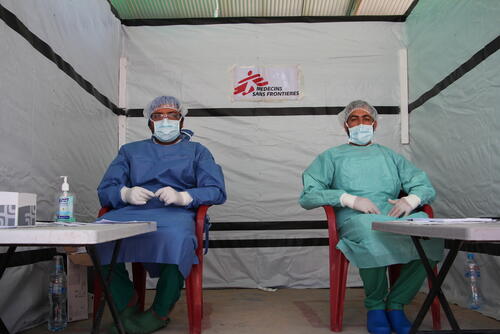Four vehicles fully loaded with boxes of soaps and masks leave the Médecins Sans Frontières (MSF) clinic at 7.00am in the morning and are taken to the four distribution points established around Machar Colony, an informal settlement in Karachi, Pakistan. At each point a team is already waiting to receive the items, and quickly supply them via tuk-tuks to the community health workers. Within 30 minutes, around 100 people are going door-to-door distributing soaps and masks to the residents of Machar Colony.
Karachi is the city worst-affected by the new coronavirus in Pakistan, and the country saw a staggering rise in COVID-19 cases in June after the first Eid holidays. With a 180 per cent increase, there were 137,000 confirmed cases of COVID-19 within a month across Pakistan. The second Eid of the year is coming up at the beginning of August, and the aim is to complete the distribution before the celebrations start.

MSF, alongside the Sindh Ministry of Health, is handing out 218,000 reusable masks and 75,000 bars of soap to people; two masks for every person over the age of 12 and three bars of soap for each household. Also accompanying the masks is guidance on how to wear them when visiting friends and relatives during Eid. The idea is that these tools will help prevent COVID-19 from spreading from infected and asymptomatic people to the general population of Machar Colony.
“The use of masks and regular handwashing with soap and water are proven measures to reduce the transmission of the COVID-19 virus,” said Anna Cilliers, MSF’s medical coordinator in Pakistan. “In an informal urban community like Machar Colony, where physical distancing is hard to maintain due to the crowded housing and high-density population, the availability of tools to implement face covering and hand hygiene are important for every household.”
MSF started working in Machar Colony in 2012, and since 2015 has been running a hepatitis C clinic for the inhabitants. There are about 25,000 houses in Machar Colony spread over an area of almost 4 km² and the population is estimated at around 120,000.

Located at the edge of a fishing harbour, it is home to migrants and undocumented people who live in densely packed neighbourhoods in small houses with their extended family, and have limited access to healthcare. Knowing the challenges faced by the residents, MSF teams have been working with the health ministry to try to reduce transmission of the virus. We have been running awareness campaigns using local cable TV, social media and face-to-face sessions to promote protective measures including mask wearing.
“People in my area live very close to each other, and there are obvious risks of spread of COVID-19,” said Gul Qayas, who offered his school building to MSF as a distribution point. “This distribution is providing people with ways to protect themselves and also increasing their knowledge about the virus.”
The recent monsoon rains have not made the task any easier, but the teams are ensuring every household receives their kit. They are out on the newly-flooded streets with their bags full of paper envelopes and leaflets explaining how to wear and reuse the masks, doing what they can to help protect those in Machar Colony against COVID-19.
MSF has been working in Machar Colony since 2012 and has been running a programme providing hepatitis C care since 2015. It has developed a simplified model of decentralized care providing diagnostics, consultation, treatment, health education and patient support services at a primary healthcare level under one roof. MSF aims to reach the most high-risk groups, which includes high risk occupations, in Machar Colony while focusing on knowledge transfer, community outreach, and advocating for better and low-cost diagnostic and treatment options for hepatitis C patients in Sindh province.
Médecins Sans Frontières is an international medical humanitarian association that delivers emergency aid to people affected by armed conflict, epidemics, natural disasters and exclusion from healthcare. MSF first started working in Pakistan in 1986, and now provides urgently needed quality medical care to people in Balochistan, Khyber Pakhtunkhwa and Sindh provinces. MSF works in collaboration with the health authorities in the country and its activities in Pakistan are funded solely by private donations, with no institutional or government contributions.






